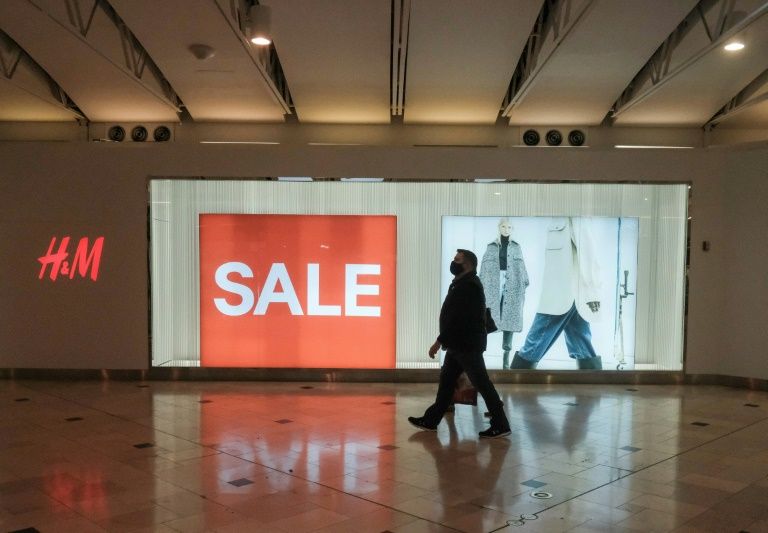Mixed retailer optimism on ‘Black Friday’ amid pandemic
New York (AFP) – The coronavirus is clouding “Black Friday” much as it has overshadowed 2020 in general, but some leading experts still expect strong overall sales even as shopping patterns are altered.
The more bullish case for the holiday shopping season cites robust demand for bigger-ticket items such as home improvement projects, new computers and home fitness machines as more people work from home and e-commerce grabs an ever-increasing share of the overall market.
Malls were open for business as usual on Friday, but there were early indications that the day-after-Thanksgiving crowds were more sparse this year as more consumers opt for e-commerce or for curbside pickup options because of the virus.
Most individual retailers say there is still too much uncertainty to project fourth-quarter sales, but the National Retail Federation offered a fairly upbeat outlook, saying shoppers “are willing to spend on gifts that lift the spirits of family and friends after such a challenging year.”
The NRF projects a 2020 jump of between 3.6 percent and 5.2 percent in overall holiday sales compared with the year-ago season.
The trade group points to optimism over Covid-19 vaccines and says many consumers have available cash from an appreciating stock market, a strong housing market and disposable income that would otherwise have gone to travel and entertainment.
– Hard times for some –
But this outlook may understate the impact from elevated unemployment levels in the United States, exacerbated by Washington’s inability to produce another round of fiscal support for struggling families.
An even bigger source of uncertainty is the coronavirus itself, which has been spreading quickly in much of the country, spurring fresh restrictions in some cities and dampening the holiday mood overall.
CFRA Research projected that 2020 would be the first holiday season of non-positive sales growth since 2008, with sales roughly flat. Last year sales rose 4.4 percent.
The projection rests on a so-called “K”-shaped economic recovery, with higher-income consumers able to splurge on bigger items and other consumers struggling to make ends meet.
Among those in the less fortunate category, “people might be spending just on essential items as they tighten their purse strings,” said CFRA Research analyst Camilla Yanushevsky.
There are some wildcards in the forecast. Sales could benefit if Washington comes through with stimulus, but would weaken further if there are widespread stores shutdowns.
One thing that isn’t in question is the growing share of e-commerce. Online sales on Thanksgiving reached a new record this year, rising 21.5 percent to $5.1 billion, according to data from Adobe.
E-commerce sales since Nov. 1 have been $71.1 billion, up 31 percent from the year-ago level, said Vivek Pandya, Senior Digital Insights Manager at Adobe. The technology group estimates an increase in 33 percent across the holiday season to $189 billion.
Sales slipped for a period after Election Day while the outcome was still in question, but “we’ve been surging pretty heavily, especially into this week,” Pandya said.
– Retailer pivot accelerates –
Conventional retailers have accelerated their efforts to address shifting consumer expectations in the pandemic.
Macy’s has invested heavily in smartphone apps to improve its curbside pickup system and launched same-day delivery through a partnership with DoorDash.
But the iconic department store continues to see sluggish performance at its flagship New York Macy’s and Bloomingdale’s stores.
“When you look at the transient population and the tourist business, that’s been the most challenged,” Macy’s Chief Executive Jeffrey Gennette said this month, adding that the company has modeled store closures because of coronavirus, but doesn’t expect that outcome.
Best Buy set up times for consumers to pick up popular new game consoles, as well as digital queues for curbside pickup. The electronics retailer has introduced a live video chat for consumers who want to shop from home.
Best Buy had a strong third quarter, but still isn’t forecasting the fourth quarter, said Chief Financial Officer Matthew Bilunas. “We are seeing Covid cases surge throughout the US and Canada at a time of significant holiday volume through our stores,” he said.
Meanwhile, the pacesetter for these changes, Amazon, now faces more scrutiny following surge.
In Germany, some 2,500 Amazon workers started a three-day strike, while the activist Athena Coalition has been holding rallies and press conferences around the United States pressing for better pay and calling for the giant to be broken up.
On Thursday, Amazon announced a $300 holiday bonus for US employees. The company has also pointed to a nationwide $15-per-hour minimum wage in the US, among other efforts to reward workers.
“Our teams are doing amazing work serving customers’ essential needs, while also helping to bring some much-needed holiday cheer for socially-distanced families around the world,” said a message from Dave Clark, senior vice president of Amazon Worldwide Operations. “I’ve never been more grateful for — or proud of — our teams.”
Disclaimer: Validity of the above story is for 7 Days from original date of publishing. Source: AFP.


